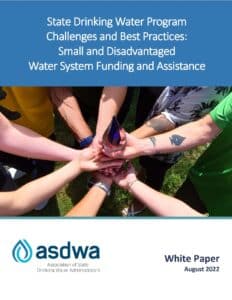“Small Systems” are defined by the Safe Drinking Water Act and by U.S. EPA as those serving populations of less than 10,000 persons. In addition, many programs and tools are targeted specifically at the smallest of the small system size categories – those serving populations of less than 3300.
Small drinking water systems face unique challenges and require extra assistance because many small, rural and disadvantaged communities have populations with low incomes that lack the resources to maintain and operate these systems using a reasonably sustainable economic approach. These communities struggle to meet their public health protection responsibilities and comply with SDWA requirements due to lack of staff, technical expertise, and funding. Different types of assistance are available for small systems from a variety of sources.
ASDWA Small and Disadvantaged Water System Funding and Assistance White Paper (8/2022)
 ASDWA worked with the Southwest Environmental Finance Center and the ASDWA DWSRF and Small Systems Committees, and Justice40 Workgroup to develop this paper. It provides information about state and water system challenges and explores a variety of state efforts and activities to fund and assist their small and disadvantaged water systems, along with specific state examples.
ASDWA worked with the Southwest Environmental Finance Center and the ASDWA DWSRF and Small Systems Committees, and Justice40 Workgroup to develop this paper. It provides information about state and water system challenges and explores a variety of state efforts and activities to fund and assist their small and disadvantaged water systems, along with specific state examples.
Funding
- State drinking water programs can provide Drinking Water State Revolving Fund (DWSRF) loans with principal forgiveness, or with zero percent or low interest, for what can essentially be a grant with low or no payments to small water systems in disadvantaged communities. America’s Water Infrastructure Act of 2018 will require states to reserve a minimum of 6 percent (and can use up to 35 percent) of their annual DWSRF capitalization grant to meet the needs of disadvantaged communities and has extended potential loan terms to 40 years.
- The U.S. Department of Agriculture’s Rural Development (USDA RD) Water and Environmental Programs can also provide loans, grants, and technical assistance for small rural drinking water systems.
Technical Assistance Providers
Technical assistance providers can help small communities with loan and grant applications, with asset management and rate setting, and more. The three national organizations listed here have local chapters and staff that are generally available to provide assistance in each state, though other organizations may be available for different locations throughout the country.
- National Rural Water Association (NRWA) is a non-profit organization that provides training and technical assistance through 49 affiliated State Rural Water Associations in areas of operation, management, maintenance, finance, governance, and source water protection directed toward small drinking water and wastewater systems.
- Rural Community Assistance Partnership (RCAP) is a national network of non-profit organizations that provides technical assistance, training, resources, and support to rural communities across the United States, tribal lands, and U.S. territories. State and regional RCAP programs and field work are managed through six regional offices.
- The Environmental Finance Center Network (EFCN) is a university-based organization creating innovative solutions to the difficult how-to-pay issues of environmental protection and improvement. The EFCN works with the public and private sectors to promote sustainable environmental solutions while bolstering efforts to manage costs. There are ten EFCs across the country that provide a variety of services and resources.
Engineering Assistance
Assistance with engineering design work is available from some states and other organizations such as the Community Engineering Corps.
Capacity Development and Asset Management
Each state has a capacity development program to help water systems acquire and maintain adequate technical, managerial and financial capacity, and conduct asset management. More information is available on the related ASDWA web page.





